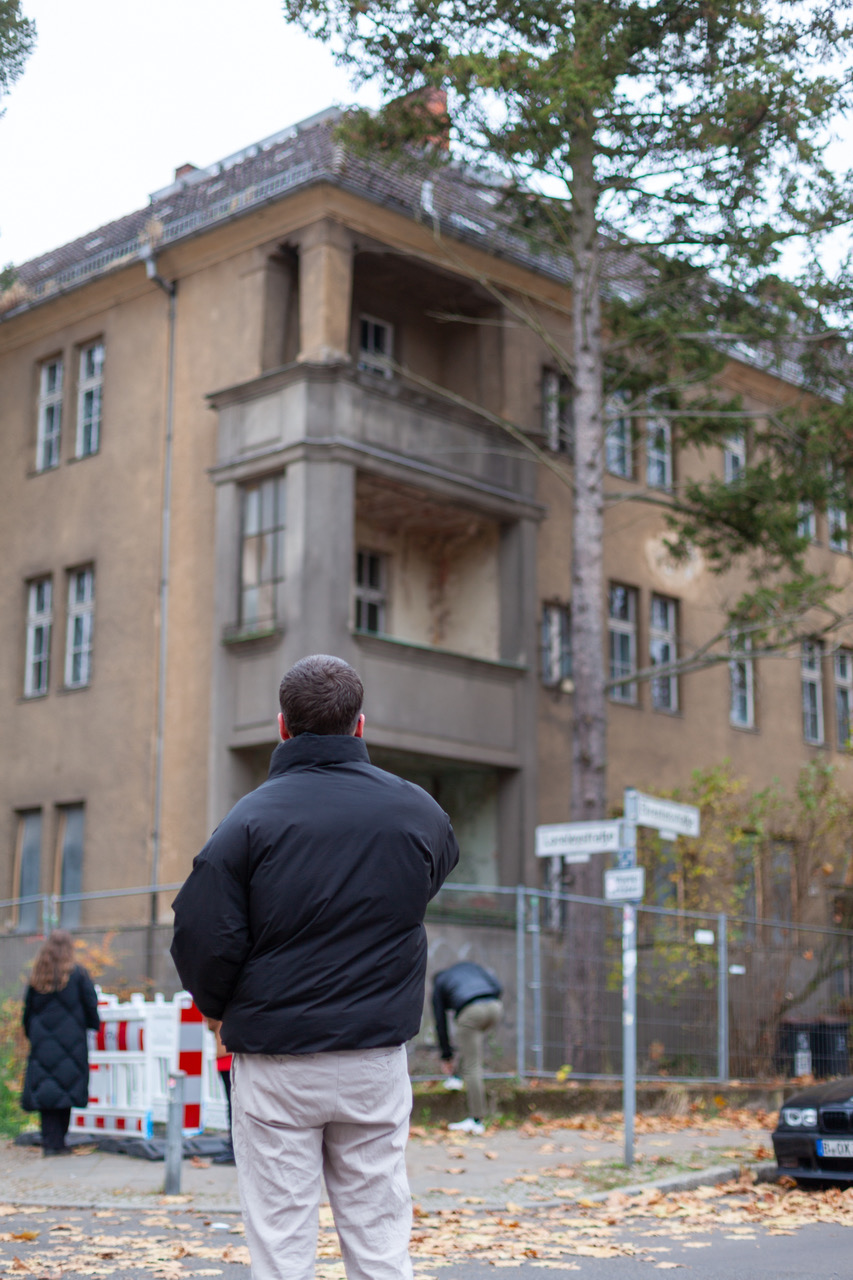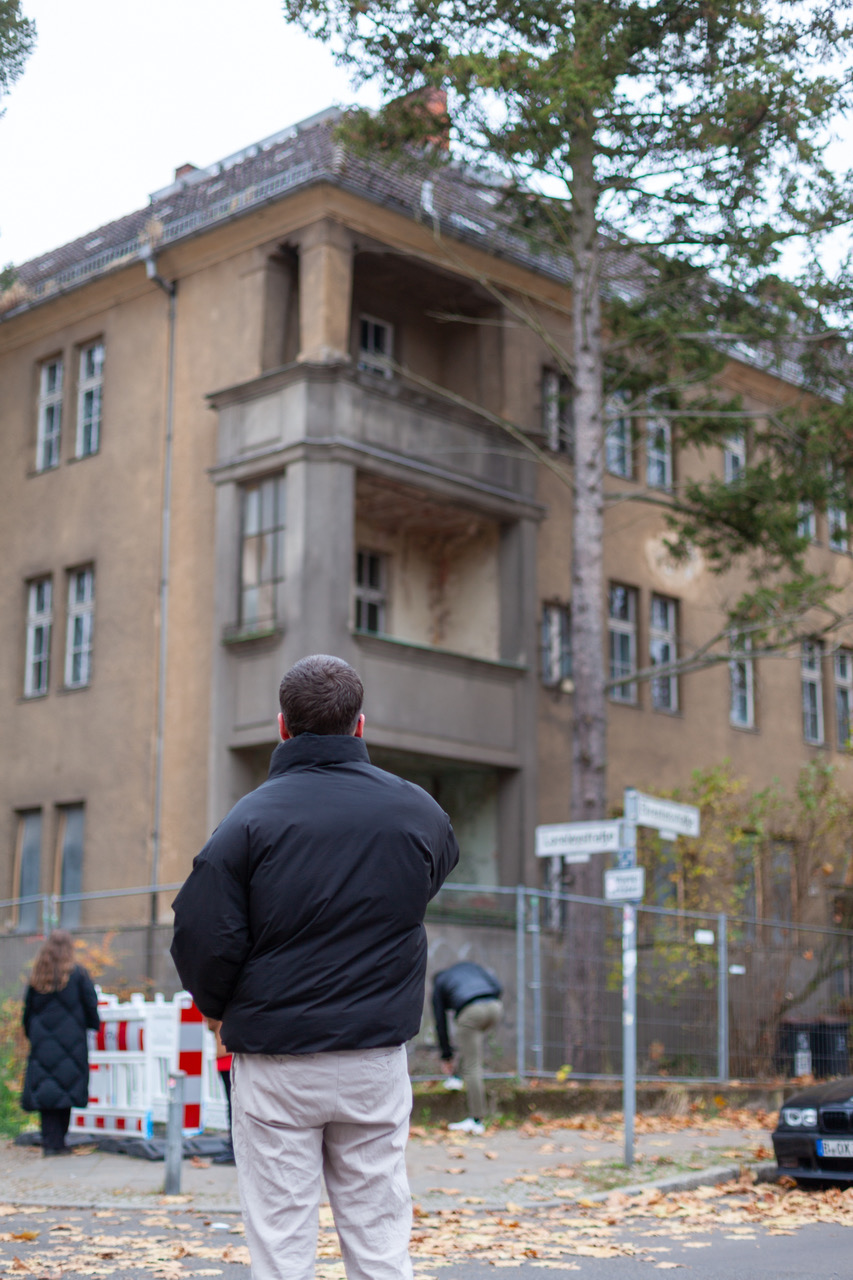Audiowalk "and let no one be forgotten"

Photo: Katya Romanova
Ehrenfelder Strasse x Loreleystrasse
Birch Trees
Location: Ehrenfelsstraße/Loreleystraße
Racoons
Location: The walk back to the station
The last stop on our audiowalk is about birch trees and raccoons, after which we return to the starting point of our tour, Karlshorst S-Bahn station.
Birch Trees
Location: Ehrenfelsstraße/Loreleystraße
and
Racoons
Location: The walk back to the station
CARO:
Here it is.
MARIANNE:
Yes.
CARO:
Somehow they look more beautiful because they’re falling apart. Does that make sense?
MARIANNE:
I don’t know. They look sad to me.
CARO:
Shall we break into this one too? (She asks jokingly)
(Marianne doesn’t respond.)
MARIANNE:
Look at the birch tree on the balcony.
CARO:
The house is at war with nature.
MARIANNE:
You never know, they might be working together.
CARO:
It’s wild that these houses have so much history. They were once so alive and now they’re so… quiet.
MARIANNE:
They’re still alive. They still feel alive to me.
CARO:
But I wish new memories could be made here. Allow them to keep living. It just feels like they’re housing
ghosts.
MARIANNE:
In a way, they are.
CARO:
I wonder what the future holds for them. In the article I read, it mentioned a dentist who basically tried to con everyone so that he could buy the houses. He pretended to be like a ‘representative’ of Russia. Then the Russian embassy was like ‘hmmm no. These are ours’.
MARIANNE:
That sounds about right.
CARO:
It’s not fair! We should just take them back. I mean, why are we respecting this ambiguous ownership? It’s not like Russia followed that line of respect. They came and took away houses from the people who were living here. Why should they get to keep hold of the houses now and just let them disintegrate? MARIANNE:
You don’t know what you’re saying. I wouldn’t want to interfere. Anyone from the East knows to stay
away from unclear property rights.
CARO:
Why not just take them back? Especially now, with the war in Ukraine.
MARIANNE:
I don’t really want any sudden expropriations because of the war situation. I’d find that worse than letting the houses sit empty for a few more years. I don’t believe for a second that the Russian government would agree to just let people move in.
CARO:
But it’s not right! There are so many people here in Berlin who need homes.
MARIANNE:
I’d prefer for everything to be resolved peacefully, if possible. Anything else frightens me terribly. Doesn’t it scare you, too?
CARO:
No, it just makes me angry.
MARIANNE:
Anger is a youthful emotion. But I’m scared to rock the boat. The whole world seems frightening now. I don’t know. Maybe I’m not remembering it right, and there was more fear than I’m recalling. But I feel more scared now.
CARO:
You don’t remember fear?
MARIANNE:
I remember my parents’ generation talking of fear. Don’t forget I was born after the war. I don’t remember a time when the Russians were our ‘enemies’ per se. To me, they were just ‘other.’
What does enemy mean anyway? It’s a trivial concept. Your enemy changes from one day to the next as soon as a new political wind blows through.
CARO:
What do you mean?
MARIANNE:
I remember my father telling me right after the war that there were neighbours they had known for years who suddenly claimed they had always been Communists. Even sometimes pretended to be victims of fascism. My parents were left speechless. How quickly enemies turned into friends. These people puffed themselves up, started showing off, and quickly gained small positions of power.
Suddenly, there were house leaders or street leaders who had to monitor their areas. They meddled in everything and reported to newly established police stations or the Russian command posts.
CARO:
See, that’s what I think of when I think of the East and the Russians.
MARIANNE:
Yes.
CARO:
You don’t remember things like this?
MARIANNE:
I remember being told things like this. I don’t think I saw it myself. Even the stories of how the Russians came into these houses. They would break down the doors; people thought they were going to be shot, but the Russians would shout in broken German, ‘Out, tomorrow’ – pointing to the 12 on their watches. And that was it. They had to leave their homes.
CARO:
That’s awful.
MARIANNE:
But they were also following orders.
CARO:
Yeah, and at some point, I guess… I guess it also happened to them with the Abzug. They also had to
leave. Without much warning. Just up and go.
MARIANNE:
(Sighing) These buildings have had so many owners.
CARO:
Yeah, but owning doesn’t seem to mean much, does it?
MARIANNE:
I guess the houses now belong to the raccoons…
CARO:
How do you think they get in?
MARIANNE:
Maybe along the roofs? Or climbing the trees and leaping onto the balconies? Honestly, there are so
many ways in for them. Ways we can’t even see.
CARO:
They’re probably having raves in there. Listening to a bit of techno. Got the turntables out. Lasers going.
Popping pills and having a little dance.
(She’s trying to lighten the mood for her grandmother, who seems rather melancholic.)
Or having fierce political debates on who deserves which room. Do you think raccoons have hierarchies?
MARIANNE:
(Not listening to Caro) You know what’s funny? They have the freedom I craved. The one we were
promised.
CARO:
True. They’re free to come and go in a way so many occupants probably never were.
MARIANNE:
Strange to think that something not even from here seems to belong the most. They’re just using them
for shelter. The most natural inhabitants of the houses!
CARO:
I tell you what, it’s going to be very hard to move them, if anyone tries to. Raccoons are persistent, no?
MARIANNE:
They’re harmless.
CARO:
I don’t know about that. Have you ever seen one? Cheeky things don’t look so harmless to me.
MARIANNE:
Anything seems harmless when you compare it to humans. They have a resilience I admire.
CARO:
Should we tell them they’re trespassing?
MARIANNE:
(Ignoring Caro again.)
It’s a sort of bittersweet chapter in the story of these houses. They’re not empty; they belong to these
little survivors, who, even when the odds are stacked against them, find ways to thrive.
I think in another life, I would’ve liked to have been a raccoon. The freedom to roam around as they do.
CARO:
I don’t know what to do with this feeling. These houses feel so alive with the past, but what do we do
with them?
MARIANNE:
We remember them. That’s what we owe these places.
Katya Romanova:
Birch trees always remind me of Russia, where I grew up.
If you turn down Loreleystraße and look up, you'll spot a few young birch trees growing right from the balcony.
My name is Katya Romanova. When I first moved to Berlin, I was curious to search for traces of this
city’s Soviet past. I wondered how events that took place in the Second World War were perceived in Germany, compared to in my home country where these histories are always shared from the perspective of liberators.
The capture of Berlin is still viewed in Russia as a hugely significant moment. And so, in Russia, they try to persuade us that talking about that war is to view everything through the lens of being a winner - a saviour. Never giving space for the darker stories, for the pain and loss that came with it. Over time, Victory Day has shifted from a day of remembrance to a celebration of military power.
With Russia’s invasion of Ukraine, I feel like I’m watching a familiar story unfold, but this time, my home country stands on the side of the aggressor— yet still trying to cast its actions as liberation. What do we choose to remember from history, and what do we try to forget?
That’s why this project resonates so strongly with me.
When we set up our 'kiosk of memory' in summer 2024, people came and shared their own experiences, their family histories, and their opinions. And I realized that these personal stories, all of them different, sometimes even contradictory, are the pieces that make up the bigger picture.
These birch trees here? They make me think of resilience. Of survival. The birch is strong, able to thrive in the harshest conditions. It is birch trees that you will find along the barren strips of the former Berlin wall. They quickly filled the vacuum.
Look up at these ones. Imagine their journey—from a tiny seed, carried by the wind, slowly pushing through the brick and plaster of the balcony. How old do you think these trees are? Were they there when the last residents left?
Do the trees make any sounds? Close your eyes and listen. Do the leaves rustle? Is there a gentle
creaking of branches? I’ve read that trees emit low-frequency sounds as they grow, which could help
them “sense” and communicate with other trees. It makes me wonder: what stories do these trees tell? What have they witnessed by standing quietly as time has moved on around them?
We’re going to walk back now. Follow Loreleystraße until Stolzenfelsstraße and then turn right. This road leads back to the station.
Racoons
Location: The walk back to the station
Sophia Kimmig:
We mostly move around in space as humans. We don't climb through trees, we don't jump from branch to branch, we move around on the floor and that's why we often don't notice what's happening outside of this horizon. This means that we rarely look up and so it can easily happen that in a busy place in Berlin right next to a bus stop with lots of people around, there is a raccoon lying and sleeping up in the treetops. If you look up, it is clearly visible, but nobody notices because nobody is looking.
My name is Dr. Sophia Kimmig. I am a biologist and I specialize in the ecology and behavior of wild animals with a particular focus on human-wildlife coexistence and animals in the city.
In cities there are many more wild, colorful, natural areas, for example in cemeteries. There you can find beautiful old trees, old gnarled oaks with tree hollows and raccoons like these trees particularly well, for example to raise their young in these hollows and they also like to sleep openly in the branches of the trees.
Old and especially abandoned houses, like this one, are very popular places for raccoons to live in the city. Raccoons are excellent climbers and therefore like to choose places that are a bit higher up. In nature, these are old trees and hollows in trees in which they can raise their young and also sleep. In the city, houses offer a kind of substitute for this. A raccoon likes to move into the attic.
Raccoons have been in Germany since around the 1930s. In fact, the animals actually come from North America and do not belong in our fauna, but were actively brought here and released. That worked very well. Unfortunately, because they have spread throughout the country and also settled in the cities. In their native North America, raccoons are also more common in cities than in the countryside. They are very well adapted to life in cities and have therefore conquered our cities in Germany and discovered the urban areas of Berlin for themselves.
Raccoons are officially classified as invasive species by the European Union. They are on a list of non- native species that can have invasive properties or invasive effects on the ecosystem or ecosystems in Europe. In fact, the question of whether raccoons are actually invasive is a hotly debated issue in science. The raccoon researchers that exist do not entirely agree on this. On the one hand, it is definitely the case that raccoons can eat animals, prey on animals that are already highly endangered. These are particularly amphibians in Germany. On the other hand, raccoons are absolute food generalists. That means they eat a lot of different things and they take what is easiest for them to get, what is most abundant. And these are not the rare species, but mostly much more mundane things that are often found in cities, for example, waste that we humans leave behind. This means that although it is clear that raccoons can have an effect on species, it has not really been conclusively scientifically clarified whether this effect is so great and so relevant that it is really invasive, that it really affects the ecosystem.
The fact that raccoons have spread so much in Germany definitely presents us with a whole host of challenges. On the one hand there are homeowners who fear damage to their buildings and on the other hand there are effects on the ecosystem, the eating of species that are already endangered by humans. At the same time, the raccoon is here and there is nothing we can do about this fact. But that does not mean that we cannot acknowledge the problem. We have to look at where the raccoon is doing what, what effects it has on people, on the ecosystem and what we can do to counteract these effects. Where can we perhaps compensate for damage, support people with advice or protect special sensitive areas in nature, for example from raccoons.
Ultimately, raccoons, just like people, are highly developed mammals that are capable of pain, suffering and emotions, and now they are here. This means that we have to look at how we can enable coexistence between the people who are here and the raccoons that we humans have brought here. A coexistence in which both sides can cope.
Wolfgang Schneider:
I can't look into Putin's head. I don't have a crystal ball. I don't know why they're doing it? Out of spite, we'll show the Germans, they don't want our gas anymore, then they won't get our houses. Or? I don't know. They'll certainly let it go, before they sell it, they'll let the houses collapse. And they're on the verge of collapse. I was in the houses myself, I looked at it. The large roof area collapsed, all the way down to the ground floor. Only the raccoon is in there. You can see its tracks everywhere. If I were a raccoon, I would move in there too.
For me, the Soviet people were always my friends. For example, I went out on New Year's Eve and a Soviet patrol came by. I stopped them and gave them vodka. And then an officer came by and took the vodka and the soldiers stood there and looked at me sadly. I actually just wanted to be friendly and wish them a happy new year. And that's how I noticed that there was something wrong with the Soviets too. And then I saw how the Soviet officers treated their soldiers. And that upset me. The ordinary soldiers were treated like cattle here. And these were actually the elite troops, the Soviets. They were allowed to go abroad. And yet they still have their officers, the way they treated their soldiers, it's indescribable.
And that got me thinking, even back in the GDR days. And I tried to find explanations. But I didn't find any.
Jeremy Knowles:
For such a ground-breaking moment, it’s often struck me as odd that there’s still no official monument or memorial to commemorate East Germany’s independence from the Soviet Union. There’s the Berlin Wall, of course. But this is more a memorial to itself - to the division and reunification of Berlin - than to independence. Many post-Soviet countries have commemorated their sovereignty by erecting a monument of some kind - Estonia, Latvia, Lithuania, Ukraine, Georgia, Armenia, Kazakhstan (to name just a few). But in Germany, you’ll find no such monument. No token obelisk, sculpture, or statue marks the end of the DDR and the beginning of a reunited Germany. Not yet, anyway.
What might that monument look like? How could it convey all that one would hope?
The houses we live in become the containers of our memories - like diaries made from mortar and glass. Look around you. At the houses lining Stolzenfelsstraße with their red-tiled roofs.
Each one has its own story. Though not just one story, we can be sure. Not just one memory. But many. To find such memories… and bring them to the present. To give them a voice and a form so they can finally speak. This, I would argue, is the task of a monument.
And… perhaps, a house isn’t such a bad form for a monument, after all.
Roadside Picnic:
“He just kept repeating to himself in despair, like a prayer, “I’m an animal, you can see that I’m an
animal. I have no words, they haven’t taught me the words; I don’t know how to think, those bastards didn’t let me learn how to think. But if you really are—all powerful, all knowing, all understanding—
figure it out! Look into my soul, I know—everything you need is in there. It has to be. Because I’ve never sold my soul to anyone! It’s mine, it’s human! Figure out yourself what I want—because I know it can’t be bad! The hell with it all, I just can’t think of a thing other than those words of his—HAPPINESS, FREE, FOR EVERYONE, AND LET NO ONE BE FORGOTTEN!”
(Recording from Lautarchiv of a Russian Ballad Pt. 2)
END
Location

